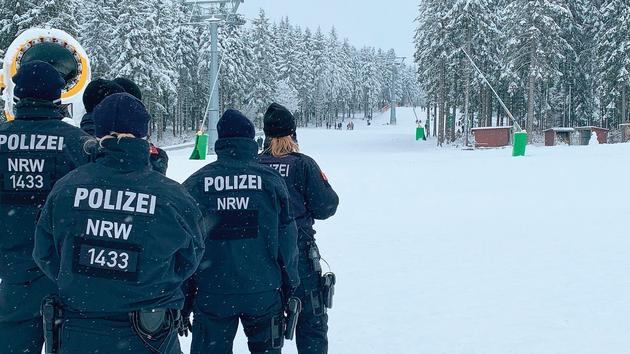While waiting for the mass vaccination of populations, restrictive measures remain the best weapon to fight against the virus.
Overview of the measures taken in the main European countries before the holidays to avoid a rebound at the dawn of 2021.
United Kingdom
The government on Thursday, December 31, extended the areas subject to the strictest restrictions in an attempt to stem the spread of the new variant of the virus.
Since then, three quarters of the population in England have been confined.
This implies the closure of bars and restaurants, cinemas, theaters and hotels.
Schools that were to reopen on January 4 will not be in London.
The
“temporary”
closure decision
was taken
“really as a last resort”
by the Secretary of State for Education on Friday January 1.
In the rest of the kingdom, Scotland, Wales and Northern Ireland are also confined.
Read also:
The UK has started its new post-Brexit life
Belgium
A national curfew from midnight to 5 a.m. remains in effect.
Gatherings in public areas are limited to four people, but shops, museums and swimming pools are open, unlike cinemas, theaters, performance venues, bars and restaurants.
The first easing of health rules will take place
"at the earliest in February"
, warned according to the interfederal spokesperson for the fight against the coronavirus, Yves Van Laethem.
Even if the country, hard hit, sees its indicators drop, the authorities are waiting for the trend to be confirmed.
Denmark
The government extended the confinement on Tuesday, December 29, until the 17 in front of the significant increase in cases in December.
Schools, shopping centers and non-essential businesses will remain closed until that date.
"This is really a closure of the company because the situation is more serious than in March"
admitted the Prime Minister, Mette Frederiksen.
Germany
More severe lockdown measures are in place until January 10: closings of shops, hairdressers and schools, as well as a ban on the consumption of alcohol in public.
But the country is
"still very far"
from the return to
"normalcy"
, the Minister of Health, Jens Spahn, warned on Wednesday January 30.
Angela Merkel and the sixteen Länder could decide on January 5 to extend the current restrictions.
Austria
Non-essential stores, closed since December 26, will remain closed until January 17.
Austrians also have an obligation to stay at home day and night, except for essential errands and journeys.
From the 18th, restaurants, hotels, cultural establishments and shops will nevertheless be able to open to those who present a negative Covid test.
Mass screenings will be carried out across the country before any relaxation of the measures.
Swiss
The country has recognized
"serious errors"
in its management of the Covid and taken national measures until January 22.
Apart from ski resorts, which are open, public places such as restaurants, museums, sports facilities and other places of entertainment are closed.
The stores have seen their capacity restricted.
Read also:
Switzerland: the President of the Confederation recognizes errors in the management of Covid-19
Italy
Restrictions are imposed until January 6 but they vary depending on the situation in each region.
It is forbidden to move from and to the orange zones (high risk) where the catering services are closed.
In the red zone, the closure is extended to businesses (except for essential items, and personal service activities).
It is forbidden to accommodate more than two people who do not belong to the family nucleus.
Spain
A national curfew is maintained between 11 p.m. and 6 a.m., excluding the Canary Islands, but the autonomous regions have the power to start the curfew earlier or later.
Several municipalities or regions, such as Catalonia and Aragon, are subject to a peripheral lockdown, preventing residents from leaving or entering the region unless there are compelling reasons.
Many cities without entry and exit restrictions have also chosen to restrict the capacity of restaurants, bars and cafes.

